During the lesson, the information for you to know is written in regular type, and what we suggest speaking or reading aloud to children is in bold. All resources for this lesson, including the Teacher Guide, Student Page, Family Connection Card, and other resources can be downloaded in a ZIP file by clicking on the following link:
In some lessons you will find "resource articles." These are articles written by experts from around the world to help equip you for your work with children and adolescents. Share them with parents or guardians if you consider it appropriate.
God gave us a spirit not of fear but of power and love and self-control.
2 Timothy 1:7, ESV
We have all made decisions we regret—and we have all faced the consequences of our poor choices. Often our worst decisions are motivated by our strongest desires—security, happiness, the need to be loved. In the face of temptation, we may let go of our self-control and try to grab onto the happiness or security we want so much. However, we soon discover that following temptation does not lead to happiness, security, or love—but following God does.
Think of the desires in your life that tempt you the most. Repeat the words of this verse each time you feel your self-control disappearing in the face of that temptation. In your most difficult situations, whisper it as a prayer. God will help you to respond in power, love, and self-control. When you allow God to control your life, you can trust that He is working for your best—even if what it looks like is not what you had desired.
Encourage the students to ask their family members, “Have you ever asked for help to choose self-control in a difficult situation? Who helped you and how?” They can then share that God can help us to choose self-control.
Teacher Tip: If possible, email or text the Family Connection Card to the families of your students.
As the teens arrive, greet them and ask them how they were able to use self-control this past week. Were the hand signals encouraging and helpful? Invite 1 or 2 students to share their signals with the whole group.
Once all the students have arrived, ask them to spread out. They should be at least an arm’s length apart. Ask them to stretch out their arms completely so you can be sure they are not standing too close together. Ask each student to pick a partner who is nearby to work with for this activity.
Stand near your partner, but be sure you are not right next to anyone else. When I say to start, 1 partner will close her eyes and spin around as quickly as possible. The other partner will make sure she does not hurt herself or others. When I say, “Stop,” the partner who did not spin will take 5 large steps away. The spinning partner will open her eyes and try to walk toward her partner. Ready? Start!
Have the students spin as you count to 10. Be sure the partners who are not spinning are watching the spinning partners so they do not get hurt.
Stop! Partners who did not spin, take 5 large steps away from your partner. Those who were spinning, open your eyes and walk toward your partner.
Give the students a few seconds to try this. Then ask them to switch roles and do the activity again.
Students may say that it was difficult to walk after spinning. They also may have almost crashed into other people or things.
It is hard to control our bodies when we are dizzy—and it is also hard to choose self-control when we have strong emotions. It is difficult not to let our emotions and desires determine our behaviour.
Allow 1 or 2 students to share stories from their lives. If possible, share your own stories now as well.
Students may give examples such as behaving violently, harming themselves and others, taking drugs, having immoral sex, or other behaviours reflecting anger, fear, or immorality.
Students may answer that it keeps us and others safer, it keeps us from making poor choices, or it keeps us from having to face the consequences of our emotional decisions.
Choosing self-control can help you to live better, safer, and more fulfilling lives. This is especially true when a lack of self-control can put you into dangerous situations or cause you to make decisions with lifelong consequences. For example, speaking angrily with a friend because you did not choose self-control may mean you have to apologize to your friend. Your relationship may even be damaged. Though not choosing self-control can hurt you and your friend, this choice may not cause a serious problem in your life. But choosing to take drugs because you want to see what it feels like can expose you to life-changing health risks—even death. Choosing to have sex outside of marriage may cause you to be infected with a sexually transmitted disease. Girls may become pregnant.
In situations where our desires or emotions are strong, self-control can be especially difficult. To fulfill our desires, we may be tempted to make poor choices that can affect the rest of our lives. Thankfully, we can ask for help as we work to have self-control—even in temptation. God wants us to go to Him when we struggle—even with things that seem too difficult for us to handle. And when He is in control of our lives, He can help us to have self-control.
Remember David, the young shepherd God chose to become the king of Israel? God saw that he was a man after God’s own heart. But when God called David to be king, Israel already had a king named Saul. After David killed the giant, he fought many battles for King Saul, and the people began to love the shepherd warrior who defeated their enemies. The people cheered when David returned from battle. This made Saul jealous and angry. He wanted to get rid of David.
Show the Action Bible image of Saul’s jealousy if possible.
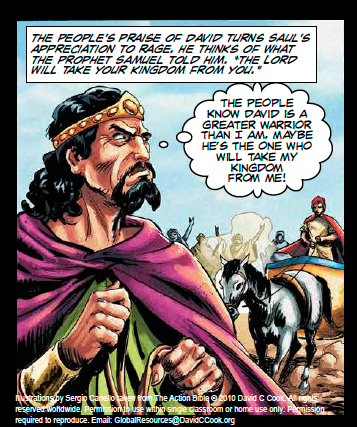
Ask the students the following question. Then read the 3 possible answers. After you have read all the answers once, tell the students you will read the answers again, and they will raise their hands to show which answer they think is right. Follow this same process with all of the questions in this story.
Saul did not choose self-control. He decided to send men to David’s house so that they could kill him.
David chose self-control. Even though he was probably tempted to try to kill Saul, David decided to avoid Saul so Saul could not kill him. David’s wife let David down through a window to escape. Then she put a small idol, like a statue, in the bed in David’s place. She put a pillow of goats’ hair at its head and covered it with clothes so Saul’s men would think David was there. Saul became very angry!
Show the Action Bible image of David’s escape if possible.
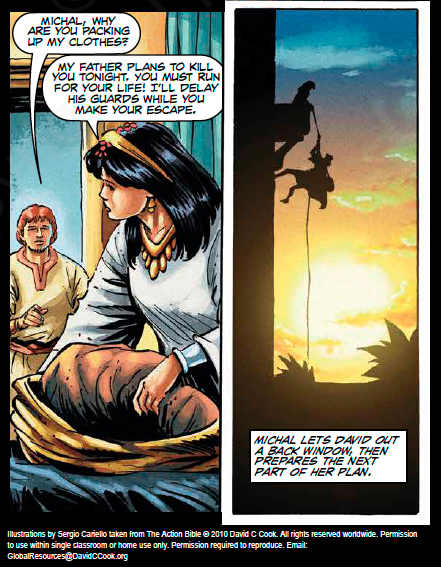
Saul did not choose self-control. He became even angrier and tried even harder to kill David. Saul and his army chased David all over the country. Each time Saul was close to catching him, David got away. In fact, the Bible says that once, when Saul and his men were catching up to him, David went around 1 side of the mountain while Saul went around the other. David must have been worried that Saul would catch him. But just then a messenger told Saul that the Philistines had attacked Israel, so Saul had to stop chasing David and go fight the Philistines.
David chose self-control. When he was tempted to kill Saul, he asked God for help. And he continued to run away and let Saul be king. David knew that God did not want him to harm Saul, even though Saul continued to chase him. One day, David and his men were hiding in the wilderness, and Saul’s army camped on a hill nearby. David and his men sneaked into Saul’s camp while Saul and his men were sleeping. This is what 1 of David’s men said.
Show the Action Bible image of David choosing self-control if possible.
Today God has delivered your enemy into your hands. Now let me pin him to the ground with one thrust of the spear; I won’t strike him twice.
1 Samuel 26:8
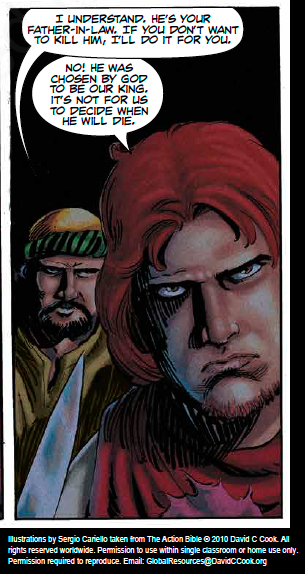
David chose self-control. Even though he may have been tempted to kill Saul, David spared his life again. The Lord had caused a deep sleep to come over Saul and his army. David took Saul’s spear and his jug of water. He went to a hilltop nearby and called out to the commander of Saul’s army. David held up the spear and asked Saul why he was pursuing him.
Saul chose self-control. He asked for David’s forgiveness. Saul said he had been foolish and promised not to pursue David to kill him anymore.
Even in situations of great temptation, David chose self-control. He offered Saul forgiveness. Listen to what David said:
The Lord rewards everyone for their righteousness and faithfulness. The Lord delivered you into my hands today, but I would not lay a hand on the Lord’s anointed. As surely as I valued your life today, so may the Lord value my life and deliver me from all trouble.”
1 Samuel 26:23–24
Students may answer that they would have been tempted to kill Saul to save their own lives or because they felt like Saul deserved death for trying to kill David.
Students may answer that David might have been executed or imprisoned. He would have had to live with the guilt of killing Saul. He would have faced consequences with God as well.
Students may answer that David would not be called a man after God’s own heart if he had killed Saul. God may not have blessed David’s reign as king. David may not even have become king.
Guide students to see that he sought peaceful solutions, he obeyed the Lord, and he asked God for help.
The Bible tells us that we can ask God for help with our self-control—even in situations of great temptation. David was faced with the decision to kill or possibly be killed. He knew that his own life was in danger as long as Saul was alive. But if David had chosen to kill Saul, even though his anger seemed just, he could have faced life-changing consequences. He may even have been killed or imprisoned. He would have guilt for the rest of his life because he had killed Saul and not obeyed God. He might not ever have become king.
David knew that he was not alone when he needed strength to choose self-control. David knew he could call on God for help. He did this in 1 of the psalms he wrote when he was fleeing from Saul.
Ask a student to read Psalm 54:2, 4–5 aloud from the Bible.
Hear my prayer, O God; listen to the words of my mouth. … Surely God is my help; the Lord is the one who sustains me. Let evil recoil on those who slander me; in your faithfulness destroy them.
Psalm 54:2, 4–5
Students may answer that David trusted that God as his Helper, and his protector.
David trusted God to help him with self-control. God can help you when you want to do or say something that will hurt you or someone else. He can help you to choose self-control in all of your difficult and tempting situations.
Ask a student to read 2 Timothy 1:7 aloud from the Bible.
God gave us a spirit not of fear but of power and love and self-control.
2 Timothy 1:7, ESV
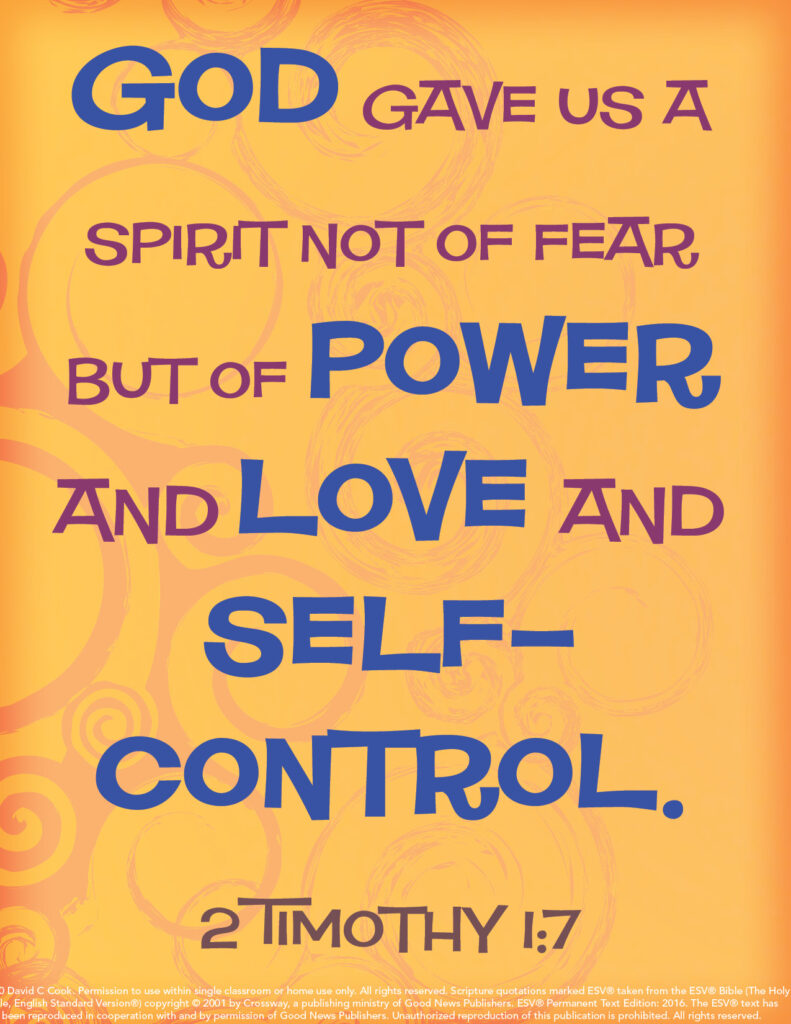
Allow 2–3 teens to share. Consider sharing about a time from your own life when you did not take your situation to God. When you share honestly from your life, your students will be more willing to share openly from theirs.
Ask students the following questions. Let the students know they will not be sharing their answers aloud, only answering quietly to themselves.
Optional: If you are using the Student Pages, your students can record their thoughts by drawing the situations in the panels on the page.
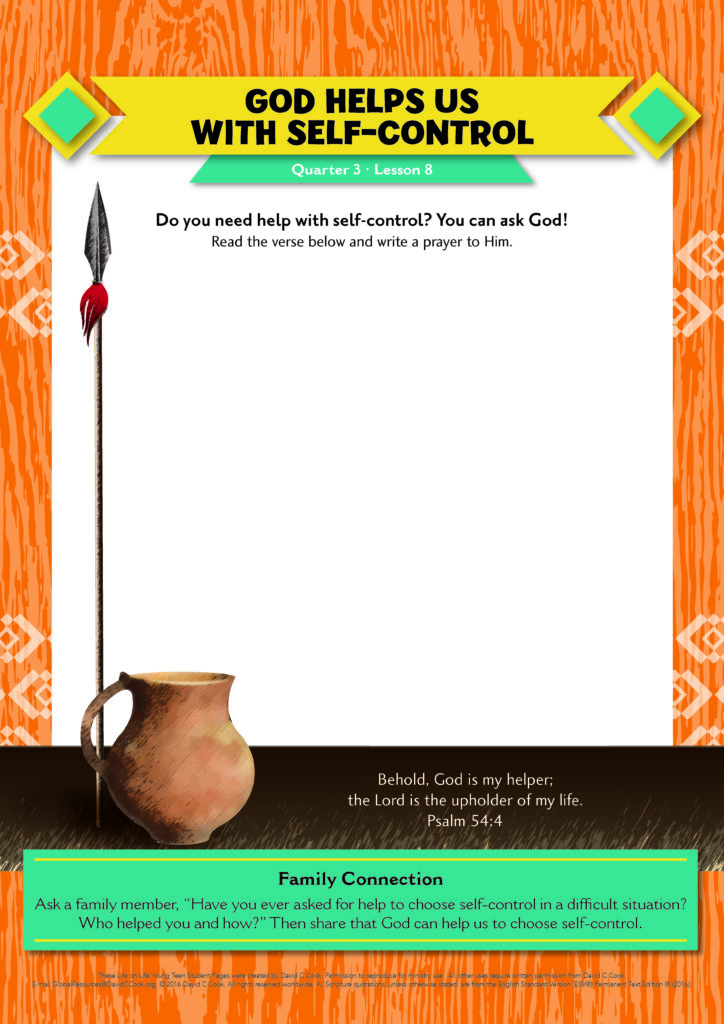
Think again of the situation in your life that will require you to use self-control. As you think about this situation, make a fist with 1 or both of your hands. Think about how you feel—angry, worried, frustrated, confused, scared. Give the students a minute to think.
Now you can bring this situation to God. You can ask Him to help you have self-control. If you ask for His help, listen to what He might be saying to you. Are there specific steps you can take to have self-control in this situation? Could you walk away when someone says something that makes you angry? Could you take a deep breath and pray quietly before speaking?
Think about using some of the self-control techniques we have already learned:
As you pray and think of the techniques you will use, release your fists. Open your fingers with your palms facing up. Your hands are a symbol of letting go of this situation and giving it to God.
Give students 1–2 minutes to pray quietly.
Close your time with this blessing based on 2 Timothy 1:7.
Blessing: May God fill you with power, love, and self-control. May He replace your fear, worry, and anger with the assurance that His Spirit can help you even in the most difficult situations.
Lead the students in singing this quarter’s song if possible.
Life on Life ©2020 David C Cook. Reproducible for home or classroom use only. All other uses require written permission from David C Cook [email protected]. All rights reserved.